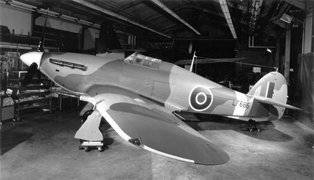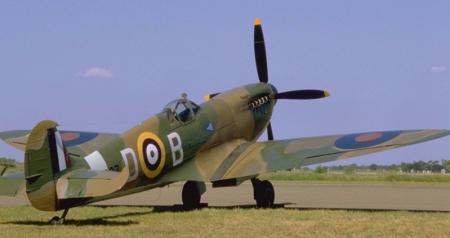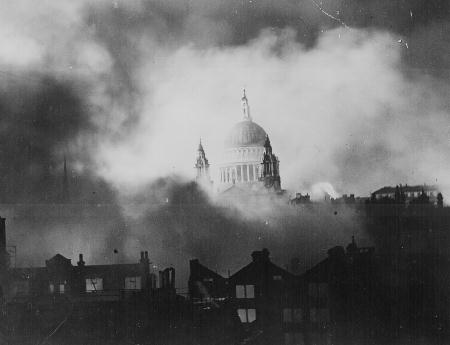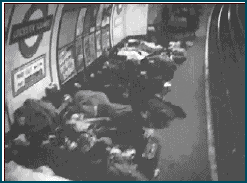

I grew up as a first generation American. Both my parents were born and raised in England. They came to Canada in the late 1940's and then moved to the United States. Growing up, I always knew that my father served in the RAF during World War II, and that my Mother lived close to London during the Blitz, but always thought that asking any questions was taboo.
Little did I know that this was not the case. Now, as an adult with children of my own, I find that all I had to do was ask. And, that is exactly what my niece did for a school project. She sent an email to my father asking him to give his side of what he went through during WWII. I was totally mesmerized by the words that I read. Not just because this man is my father, but because of the pictures he painted in my mind and memories that he put on paper for future generations. The following contains the memories of my father, a man that I love dearly. The changes I have made are few and involve changing "your grandmother" to "my wife" or other small, similar, changes.
Elizabeth Clarke Talton
As far as World War II is concerned, it is fair to say that, in a way, we were connected to it since our birth. We grew up in the middle thirties, adolescents and vaguely aware that life would not go on the same way it had done for a number of years.
The Great Depression did not affect us as it did the people in this country and we muddled through somehow. In 1936 I came over to the States and Canada on a hiking and canoeing trip with the Boy Scout Troop at my high school and enjoyed the freedom and space that we found over here.
In 1938, even as a seventeen year old, I realized, as did my friends, that war was skulking in the near future. Of course, the government of England was aware of it and did not speak too loudly for fear of exciting the populace. Even so, preparations for war had begun back in 1935 when it became obvious to the internationalists that the ever widening circles of disruption caused by Hitler were beginning to unsettle the entire Western Europe, and in fact, most of the world except for the United States, where a strong Isolationist feeling prevailed.
This is indicated by the funding of new warplanes that could replace the old, slow, biplanes of the post World War I era. The Hurricane and the Spitfire came off the drawing boards and into limited production in 1936.


Around this time, a movement towards enlarging the Royal Air Force was instituted and Auxiliary squadrons were formed in major towns on a volunteer basis, a sort of weekend flyer program.
I remember asking my father for his permission to join the local squadron, which he gave wholeheartedly. Why I did not go through with that plan is now forgotten, perhaps because it cost more money to belong to such a squadron than I had available.
The next thing that happened on the international scene apart from such things as the taking over of the Sudatenland and the occupation of the Saar, and the visit of the British Prime Minister to Munich to face up to Hitler, who, at that time said that he had no more territorial claims, was the invasion of Finland by Russia.
This really excited quite a lot of British youth, and when advertisements appeared in local papers recruiting volunteers to go to Finland to fight the Russians- a David & Goliath confrontation, this seemed to be the way to go.
We imagined ourselves dressed in all white furs, on snowshoes or skis, armed with a rifle and hunting down down the Russian Invaders. Fortunately, my father said no to that because I do not think too many of those volunteers survived to draw their old age pensions.
As things went from bad to worse, and the days dragged out, the first burst of enthusiasm was tempered to a philosophy of "If war does break out, I am going to jump right in, or go right away to the farthest spot I can find in Canada, not thinking that it would encompass the entire world when it came, and that no where in any of the British Commonwealth would be too far away to be found.
Then, on September 1, 1939, the Germans invaded Poland and, as the Government had a mutual aggression pact with Poland, they gave an ultimatum to the Germans..."Get out of Poland or we will declare war". As you know, Germany did not get out of Poland, and on September 3, 1939, Britain declared war on Germany. This was on a Sunday, and we were attending morning service as usual (back in those days, we went to morning service, afternoon Sunday School, and then evening service, that was our custom in the Methodist Church) when the church caretaker interrupted the service to announce that the Prime Minister would be addressing the country at 11:00 AM. We all trooped out of the church into the adjacent caretaker's house and listened to the fateful announcement.
After the service, we were discussing the situation among our gang, and one of the fellows who had been my friend since grade school, and who had also won a scholarship to the grammar school we both attended said we should volunteer. As a result, the next day, Norman and I went down to the recruiting depot in town and volunteered for the Royal Air Force as pilots.
We had our examinations, and I was rejected because right at that time, I had a huge boil on my left hip. The rational was that thousands of young men were volunteering, the facilities were overwhelmed, and what was the point of signing on someone who would need medical attention right away.
Was I mad! I went home and told my father and he suggested a kill or cure remedy. I was to take a pint milk bottle, fill it full of boiling water, and when it was thoroughly heated, pour out the water and clap the neck of the bottle over the boil. The idea being that as the bottle cooled, the air inside would contract and produce a vacuum action on the boil and extract it. So much for theory (although I just had that theory recalled by a correspondent in England who was talking about the old days and the medical remedies that we had). The next night, I was still so mad that I resolutely slept on my left side, and miraculously expelled the boil contents. So back to the recruiting office only to find that they were not accepting any more volunteers for the RAF.
So then I went over to the tank corps and asked for a commission in a tank regiment. The Colonel who did the interviewing was quite agreeable and we sat down to fill out the forms. Everything went fine until we reached my age, and as I was too young to be drafted, I could not be considered for a commission. Then I went over to the Royal Army Motor Corps, but they were full. Next I tried the Signals, and a question was asked... 'Did I have a leaning towards wireless' and truthfully I answered "Yes". Of course I did, I had no problem leaning over and turning the wireless (radio) on and off.
When that did not provide me with what I wanted, I went back to the Air Force and told them to put my name back on the waiting list, and that is the way we left it in September 1939. Just before Christmas, my friend Norman was called up, put through pilot training and graduated to flying Hurricanes. His squadron was chosen as part of the wing that went to help Russia defend it's northern port of Murmansk, and was the only RAF pilot to be killed on the Russian front.
Eventually I was called into the service and after training in the stocking and issuing of all kinds of equipment, was posted to a fighter squadron. This squadron was commanded at that time by Squadron Leader Peter Townsend, who eventually became a Group Captain and served as aide to King George VI. It was during this part of his career, and after he had been air attaché in Brussels that he was involved with Princess Margaret, and wished to marry her. This was after the end of the war, and he was refused permission because he was a divorcee. It so happened that I attended his first marriage which was held in a small village near the air base close to the town where I met my wife. This small village was also the one where her Grandfather was born.
Anyway, back to the earlier years. Not too long after I met my wife, I was chosen to go overseas. Maybe chosen is the wrong word. Anyway, on the fighter squadron there were two store keepers, one in A. flight, and one in B flight. One day, the squadron adjutant called us both into his office and told us that one of us had to go overseas. The fairest way was to toss a coin for the honor (?) and I lost, and Lofty Preston (cannot remember his given name, just his nickname) was jubilant that he was staying. Well, I went to West Africa to the country that is now Ghana. but I later heard that he was posted to India which was a four year station up against my two years in West Africa.
During the time I was there, the station was one that received fighter planes in crates from the U.K. and the U.S., assembled them, and after they were flight tested, were flown up to Cairo in Egypt to build up the defenses there. I worked in the squadron office and by that means heard that Command was looking for a volunteer to go on liaison with the Free French in what is now the Central African Republic. Not having the idiocy of volunteering knocked out of me by this time, I volunteered and was accepted. I was flown through Nigeria, the Camerouns, to what was then French Equatorial Africa. I was on that base for several months and had just arranged to visit many of the French bases in the Chad and the Congo when I was recalled because of the draft that I had come out from England on was due to return.
Not too long after I was back in England, arriving in November I was dating my future wife, and in June, four days after the D-Day invasion, we were married. I had saved up leave for that occasion, and when the time drew near, I requested my leave only to learn that all leave was cancelled. We were not told why, but knew that an invasion of the continent was imminent anyway. By appealing to my C.O. and through him to the Station C.O., they were able, with special permission from Command to get me a weeks leave.
Unlike this country, the war was a total war as far as the British were concerned, and women were drafted just as were the men. My wife was the head of a department in the home office of an insurance corporation, and as such, was protected from the draft. Even after we were married, the same rules applied. If she had left her job, she would have immediately been drafted. As it was, when she was pregnant with our first child, a doctor's certificate was required before she could resign from her job. It so happened that around this time, the Germans were firing VI rockets into England, and as she lived close to London, both at work and at her parents home, we thought that it would be prudent for her to move up to my parents home in Yorkshire, 200 miles north of London.
The fact that men and women were exempt from the draft did not mean that they had a life of relative comfort. Even though my wife's office was relocated from the City of London, to a small town west of the city, she still had to go through London on the weekends if she wanted to visit her folks, and that was not always a safe thing to do, as the Germans were still bombing London as they had been doing since the first of the year of the war.


Not satisfied with enduring the dangers of travel through London to get home, she was also a volunteer with the Y.M.C.A. on those weekends. This meant that she would be working in the main stations, wherever she was needed on any particular weekend, with the Y.M.C.A. making and serving sandwiches for the troops on the trains coming through London on their way to who knows ??? She has a couple of certificates attesting to this service and this type of service was just as much in the front lines as being on an Air Force base as I was. The only difference was that we could fight back, and the civilians could not, which made their effort so much more worthy.
After we were married, I continued working at the Station Equipment Section for a bomber base occupied by two squadrons of Lancaster heavy bombers. I was in my office one day when a pilot, new to the squadron, walked in and wanted a new microphone for his flying helmet. He needed the equipment for a raid that night. Imagine my surprise to recognize a friend who graduated with me in my class in high school. He was a replacement for the leader of a crew that had not come back from a raid the previous week. We chatted, recalled old friends and days at school. He went on the raid and the next day I had the sorry task of writing to his parents. It was not an official letter because his squadron commander or squadron adjutant did that, but as he was a school mate, I thought that his parents would like to know that I had talked to him.
Within a few days of the war with Germany, the rumor began spreading that a surrender by Germany was imminent and another corporal friend and I started discussing going home, actually AWOL. We lived in adjoining towns and had hitchhiked home on approved leave a time or two before. As the day wore on, the rumors got thicker and finally he called me up and said "Shall we go??" and I agreed. So, we just walked out of camp, past the guards who did not make any movement and we were on our way. When I got home, I found that my wife was climbing up a twenty five foot tree to fasten a flag to the top branch, because, we had confirmed on the way, that the surrender had been made. Incidentally, when I got back to the base a day or so later, it was in the late afternoon, and one of the hangers had been all decorated up and had large tables full of beer, and eats, and beer, and there I ran into my C.O., a flight Lieutenant, who addressed me and asked where I had been. I just told him "Home" and he was too drunk to say anything further. I got away with it because he should have charged me at that time. The next day was too late.
Not too long after that, after moving to another base returned by the USAAC where we cleaned up all the equipment, trucks etc. and shipped it(them) back to a holding depot, I had enough points through length of service- six years, and two of those overseas, to qualify for release to the Reserve. When I signed up it was for the Duration of the Present Emergency, and as you know, that emergency lasted for many, many years after the end of the hostilities. In fact, I was still on the Reserve I suppose until the Berlin Wall came down. I never did hear if the "emergency" was ever declared over, or just allowed to die a natural death.
For all the years in service, a grateful government gave me a set of civilian clothes and about $240.00 mustering out pay.